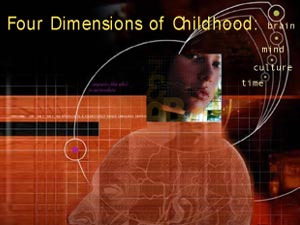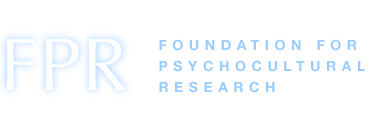Four Dimensions of Childhood: Brain, Mind, Culture, and Time
February 11–13, 2005
University of California, Los Angeles
 Presented by the Foundation for Psychocultural Research (FPR) and UCLA Graduate Division
Presented by the Foundation for Psychocultural Research (FPR) and UCLA Graduate Division- Sponsored by UCLA Neuropsychiatric Institute in cooperation with the FPR and UCLA
- With the support of National Institute of Child Health and Human Development (NICHD) and National Institute of Mental Health (NIMH)
The purpose of this 3-day conference was to explore the interaction of social experiences and neurobiology during childhood and their mutual influence on resilience and mental well-being or vulnerability to psychopathology.
Specifically, we looked at early neural development, including sensory and behavioral plasticity as well as epigenetic regulation of behavior in animal studies; the social construction of early childhood; the more complex experiences encountered in later childhood, including initiation rites, affiliative behavior, and competitive interactions; the clinical implications of early adverse experiences such as child maltreatment; and finally ethnopsychological and biocultural models for the study of resiliency.
The conference brought together a multi-disciplinary group of internationally recognized researchers and scholars representing the fields of anthropology, neuroethology, neurobiology, cognitive neuroscience, psychology, and psychiatry.
What made this conference unique is the opportunity for participants to seriously engage each other’s work through paper presentations, clinical and ethnographic case studies and roundtable discussions in order to present a many-faceted view of how childhood unfolds in time and space.
CONFERENCE SESSIONS
DAY 1: Pre- and post-natal development and the formation of social behaviors during infancy from combined neurobiological, ethological, psychological, clinical, and anthropological perspectives.
DAY 2: Social construction of childhood, including negative or stressful experiences such as neglect, maltreatment, bullying, initiation rites, and social suffering.
On DAY 3: Implications of early social experiences with respect to both psychopathological and normative outcomes.
ACCREDITATION
![]() Category I Continuing Medical Education (CME)
Category I Continuing Medical Education (CME)
This is an activity offered by the UCLA Neuropsychiatric Institute, a CMA-accredited provider. Physicians and Psychologists attending this course may report up to 20 hours of Category I credits toward the California Medical Association’s Certification in Continuing Medical Education and the American Medical Association’s Physician’s Recognition Award. Each Physician or Psychologist should claim only those hours of credit that he/she actually spent on the educational activity.
